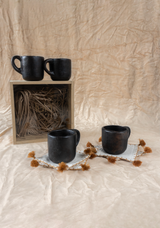Set de 4 tazas de barro con cocteleros
Descubre la esencia de El Salvador con nuestro exclusivo set de tazas de barro negro.
Una obra artesanal elaborada por las manos de mujeres de la comunidad de Guatajiagua, Morazán. Estas tazas, hechas a partir de barro negro, no solo celebran una técnica ancestral, sino que representan el empoderamiento de mujeres artesanas que, a través de su arte, transforman sus vidas y comunidades.
El set viene cuidadosamente presentado en una caja de madera sostenible con una ventana de vidrio que resalta el elegante diseño de las tazas. Cada pieza refleja la belleza de lo hecho a mano, con un acabado único que hace de este set un regalo corporativo perfecto, fusionando sostenibilidad, comercio justo y un toque de la cultura salvadoreña.
Este set de tazas es un homenaje al arte tradicional, ideal para aquellos que buscan regalos corporativos éticos, con un impacto positivo y una historia que contar.

INCOME

 The norm in rural areas is that children between the ages of 10 to 12 work the fields with their parents taking care of crops.
The norm in rural areas is that children between the ages of 10 to 12 work the fields with their parents taking care of crops.SCHOOLING


58% of the people that live in rural areas in El Salvador live in overcrowded conditions. When there is overcrowding in families, there is a higher risk of certain problems occurring, such as domestic violence, family disintegration, poor school performance, among others.

300 SALVADORANS TRY TO MIGRATE TO THE UNITED STATES DAILY DUE TO LACK OF WORK OPPORTUNITIES.
When Lula Mena began working in rural communities, many of the young women wanted to immigrate to the United States. Now that they have seen that there is an opportunity for a better life in their community, their perception of immigration has changed. They feel more confident that they will be able to provide for their families without having to leave the country. We want to continue to grow in order to offer more young adults the opportunity to work with us and avoid immigration.

One of the major challenges we faced when we began working with women was gaining the approval of their husbands. Most of the husbands and family members worried that the women would not be able to work and meet the household’s responsibilities.
Now, their husbands prepare dinner, take care of the children, and offer them support. There is still a strong sexist culture, “machismo”, in rural areas of El Salvador that we are trying to change by empowering women.






